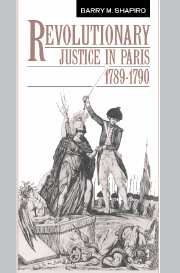Book contents
- Frontmatter
- Contents
- Preface
- Acknowledgments
- List of abbreviations
- Introduction
- 1 Revolutionary justice in 1789–1790: the Comité des Recherches, the Châtelet, and the Fayettist coalition
- 2 The judicial aftermath of the July Revolution
- 3 The Besenval affair: amnesty or prosecution?
- 4 Lafayette, Orléans, and the October Days
- 5 The post-October Days campaign against the left
- 6 The Favras conspiracy
- 7 The Favras–Besenval judicial transaction
- 8 The Maillebois conspiracy
- 9 The October Days affair and the radicalization of the Comité des Recherches
- 10 The Maillebois and October Days affairs: mutual amnesty and the breakup of the Fayettist coalition
- Conclusion
- Notes
- Select bibliography
- Index
2 - The judicial aftermath of the July Revolution
Published online by Cambridge University Press: 16 October 2009
- Frontmatter
- Contents
- Preface
- Acknowledgments
- List of abbreviations
- Introduction
- 1 Revolutionary justice in 1789–1790: the Comité des Recherches, the Châtelet, and the Fayettist coalition
- 2 The judicial aftermath of the July Revolution
- 3 The Besenval affair: amnesty or prosecution?
- 4 Lafayette, Orléans, and the October Days
- 5 The post-October Days campaign against the left
- 6 The Favras conspiracy
- 7 The Favras–Besenval judicial transaction
- 8 The Maillebois conspiracy
- 9 The October Days affair and the radicalization of the Comité des Recherches
- 10 The Maillebois and October Days affairs: mutual amnesty and the breakup of the Fayettist coalition
- Conclusion
- Notes
- Select bibliography
- Index
Summary
With Comité des Recherches prosecutors and Châtelet judges now finally in place, the new Fayettist system of political justice was immediately confronted with an important piece of unfinished business left over from the previous summer. For by putting off the creation of a lèse-nation tribunal until after the October Days, the National Assembly had, in effect, been suspending judgment on the “aristocratic conspiracy” that had provoked the Paris Revolution of July 12–14. In the next two chapters, I will look into the controversies that developed after July 14 around the question of whether the defeated “conspirators” should be punished by the victorious revolutionaries, controversies that would be inherited by the Châtelet and the Comité. In doing so, I will pay particular attention to the case of the Swiss-born military commander Pierre-Victor-Joseph Baron de Besenval (1721–91), who, for reasons that will soon be made clear, would be the only major “July conspirator” actually put on trial. In examining the Besenval case and a group of associated cases, I will trace the emergence of a dialogue between two competing conceptions of revolutionary justice: a conciliatory and indulgent justice that reflected the humanitarian assumptions of the pre-revolutionary judicial reform movement, and a repressive and punitive justice that would become increasingly dominant as the Revolution unfolded. However, before turning to this dialogue, let us briefly explore a parallel dialogue that had been carried on within court circles prior to the July Revolution.
- Type
- Chapter
- Information
- Revolutionary Justice in Paris, 1789–1790 , pp. 35 - 58Publisher: Cambridge University PressPrint publication year: 1993

